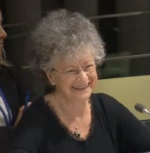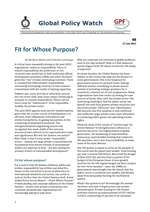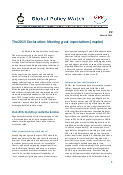Global Policy Watch
Published on Wed, 2015-11-11 15:20
After a two days meeting in Bangkok, at the end of October, the statistical experts of the UN agencies have come with a controversial list of 159 “generally agreed” indicators to measure the Sustainable Development Goals approved last September by the UN.
Traditionally, development agencies have tried to summarize in a single indicator or index complex development goals. Thus, UNICEF emphasized infant mortality as a proxy indicator of its mandate to protect children, the World Bank has traditionally equated development with per capita income, and UNDP enriched that idea with its Human Development Index based on a larger but still reduced set of indicators. Those single figures were considered to correlate so closely with other relevant indicators (for example infant mortality correlates with child underweight) that they were considered as useful to represent broad trends, progress or regression, in realities that everybody understood as being complex.
|
Published on Mon, 2015-09-28 20:12
Last August 2 in New York, the United Nations agreed on the new sustainable development agenda as the guide for their global, regional and national policies over the coming fifteen years.
At the core of this new global consensus, seventeen “sustainable development goals” (SDGs) spell out a vision for a better future where poverty everywhere will be eradicated, inequalities within and between countries will be substantially reduced, and current unsustainable consumption and production patterns will be transformed.
|
Published on Fri, 2015-09-25 15:14
The Sustainable Development Goals (SDGs) negotiated painstakingly over two years by all UN Member States with thousands of public interest organizations providing their commitment and expertise have been copyrighted. And by whom? The UN you would think? But no. They have been re-branded as Global Goals (GGs) and the copyrighted by Project Everyone, a private company incorporated and registered in London.
On its own website (www.globalgoals.org), Project Everyone claims ownership of the 17 icons that it is popularizing, with active help from celebrities and the UN Secretariat itself, representing each of the 17 Goals that the heads of State and Government are endorsing this week as common objectives of humanity from here to the year 2030.
|
Published on Mon, 2015-09-14 09:24

Photo: UN webtv
|
"The UN must champion a process of truth and reconciliation" in development, said Barbara Adams, on behalf of Global Policy Forum and Social Watch during a round table at the United Nations in New York. Adams emphasised that "those who have benefitted the most from the past and current model are those that need to change the most".
|
Published on Fri, 2015-07-31 18:12
A critical issue repeatedly arising in the post-2015 negotiations relates to responsibility. There is shared responsibility, the preference of rich countries who would like to shift traditional official development assistance (ODA) and other “burdens” given the “rise” of some developing countries. There is common but differentiated responsibility, stressed by developing countries to link common commitment with the reality of varying capacities.
Debates also circle, directly or otherwise, around the role of the state, with some camps continuing to promote its central responsibility. Others call for more room for “stakeholders” to be responsible—notably, the private sector.
|
Published on Wed, 2015-07-08 11:07
With pens still hovering over the Addis Ababa Action Plan, the outcome agreement for the Third International Conference on Financing for Development (FfD3), there is already a sense that for all the recent talk at the UN about ambition and transformation, it is falling short. For a financing document, the Action Plan includes an impressive number of references to issues at the core of sustainable and inclusive development, like social protection, essential services, decent work for all and sustainable industrialization. There are multiple references to consumption and production, a rebalancing of which, among the rich and the poor, will determine the future of our world.
|
Published on Tue, 2015-07-07 13:34
A graphic summary of the state of the negotiations around the post-2015 development agenda in the first days of July, showing where there is consensus and who is behind the different conflicting propositions. Green, Yellow, Red The issues highlighted are arranged in 4 groupings: - Preamble and declaration - Goals and targets - Means of implementation. - Follow-up ad review These groupings mirror the four main sections of the draft UN outcome document for the post-2015 development agenda currently being negotiated by governments at UN headquarters in New York. This summary was compiled by GPW based on national and negotiating group interventions in 3 main clusters.
|
Published on Mon, 2015-06-29 00:00
While negotiations on Financing for Development and the means of implementation of the Sustainable Development Goals (SDGs) within the UN are deadlocked, a new Global Financing Facility (GFF) in support of Every Woman Every Child is going to be established outside of the UN. The creation of the GFF was initiated by the World Bank and the governments of Canada, Norway, and the United States, and announced at the UN General Assembly in September 2014. It will be officially launched in July 2015, at the third Financing for Development Conference in Addis Ababa, Ethiopia.
The GFF is expected to play a key role in financing for reproductive, maternal, newborn, child and adolescent health (RMNCAH) and will serve as a major vehicle for financing the proposed SDG on healthy lives. It is being positioned as the most important new funding mechanism for the SDGs and the Post-2015 Agenda, similar to the Global Fund or GAVI.
|
Published on Fri, 2015-06-12 10:24
The year 2015 –amongst many other things- marks the 20th Anniversary of the UN World Social Summit. The Social Summit brought about the principle of universality as its main outcome determined that that all countries have to pursue the objectives of eradicating poverty, achieving full employment and enabling greater social inclusion simultaneously. The Social Summit generated an extraordinary participation by civil society organizations ranging from development NGOs, women’s organizations, trade unions, social movements and other groups focused on domestic issues. It also inspired the creation of the Social Watch network, report and movement.
|
Published on Tue, 2015-06-02 18:05
Almost one third of the targets that define the 17 Sustainable Development Goals approved by the governments at the UN are being de facto rewritten or deleted by the Inter-Agency Expert Group proposal of “priority indicators” published June 1 in New York. Important notions included in the SDGs such as labour rights, women rights to property, financial services, inheritance and natural resources and many commitments of developed countries to support the efforts of developing countries are excluded from the proposed list of indicators and would therefore not form part of the UN reviews of the new development agenda.
|

|









